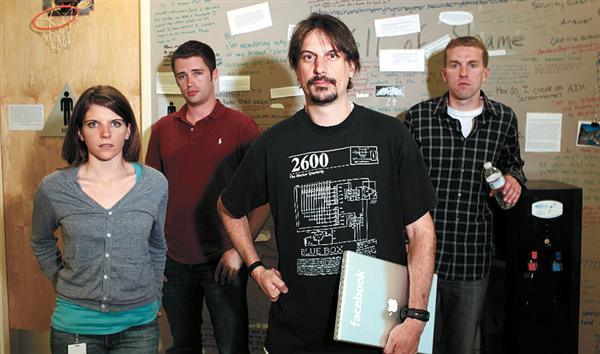Walking the Cyberbeat
To make Facebook advertiser-friendly, its 'porn cops' delete risqué content and enforce decorum.

It's just before lunchtime in the sunny, high-tech headquarters of Facebook in Palo Alto, Calif., and Simon Axten is cuing up some porn. A photo of a young couple sloppily making out pops onscreen. It's gross, but not against the rules, so Axten punches a key to judge the image appropriate. Next up: a young woman in panties only, covering her breasts with her hands. "That's pretty close," Axten says, pondering the image. There's nothing arbitrary about his judgments: at Facebook, they have developed semiformal policies like the Fully Exposed Butt Rule, the Crack Rule and the Nipple Rule. In this photo there's no visible areola, he decides, so it stays. The next photo is a male clad only in a black thong and angel wings. Utterly nonplussed, Axten OKs the picture. After delivering a verdict on 75 of the 438,848 outstanding photos flagged by Facebook users—buff guy soaping up in the shower (OK); girl blowing an epic cloud of pot smoke (he deletes it); an underage user drinking from two liquor bottles at once (ditto)—Axten is off to a meeting. It's just another day at the office of the world's fastest-growing social-networking site.
At Facebook, Axten isn't some fringe employee doing unmentionable work. The 26-year-old Stanford grad is one of some 150 people the young company employs to keep the site clean—out of a total head count of 850. Facebook describes these staffers as an internal police force, charged with regulating users' decorum, hunting spammers and working with actual law-enforcement agencies to help solve crimes. Part hall monitors, part vice cops, these employees are key weapons in Facebook's efforts to maintain its image as a place that's safe for corporate advertisers—more so than predecessor social networks like Friendster and MySpace. "[They were] essentially shanghaied by pornography and sexual displays," says David Kirkpatrick, author of the forthcoming book "The Facebook Effect." It's a tricky job: by insisting that users sign up under real names and refrain from posting R-rated photos, Facebook hopes to widen its user base to include upscale professionals, but at the same time it's aware that too much heavy-handed censorship could upset its existing members. "If [Facebook] got polluted as just a place for wild and crazy kids, that would destroy the ability to achieve the ultimate vision, which is to create a service for literally everyone," Kirkpatrick says—and then its potential for profits would disappear, too.
Full Story at Source: http://www.newsweek.com/id/195621
|

